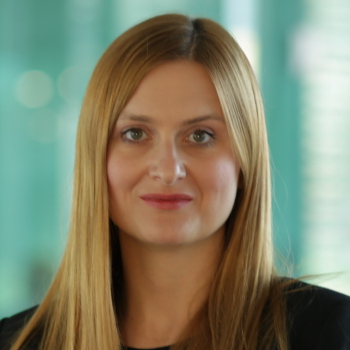Open Access accelerates sustainability
Kamila Markram
Profession:
PhD in Neuroscience
Position:
CEO and co-founder of Frontiers, a leading Open Science Platform

Profession:
PhD in Neuroscience
Position:
CEO and co-founder of Frontiers, a leading Open Science Platform

With soon to be 9 billion people on the planet, we need to establish a more sustainable economy, urges Kamila Markram. Scientists are working hard on these issues, but progress is delayed by paywalls in front of new publications.
New breakthroughs in science occur almost daily. Many of them would be very useful to further a more sustainable economy and to provide food and shelter for a growing population. However, customarily, new results are published in scientific journals and many of those charge expensive subscription fees to researchers, universities, and interested readers around the world. Thus, argues Kamila Markram, if new research results would be freely available - under so-called Open Access conditions - communication and knowledge exchange between researchers would be much better and faster. As the CEO and co-founder of the Open Science Platform "Frontiers", she is an avid advocate for freely availabe research results, which in turn will speed up the development of a more sustainable future economy.
How can research and science help us secure a more environmentally friendly and sustainable future?
Research and innovation are key drivers of productivity and economic growth. They create new knowledge that can be translated into new or improved technologies, products, services and processes. As the worldwide population grows from 7.4 to an estimated 9 billion people by 2050, the earth is entering the Anthropocene – the first period in history in which a single species has placed basic earth systems in danger. We are in a race against time and need science-based insight and evidence more than ever to tackle critical challenges in health, climate change and environmental sustainability.
Sustainability is a huge and complex topic spanning industry and agriculture – in your opinion, which aspects are most important and urgent?
As part of their sustainable development agenda to ensure prosperity for all, the UN has put together a comprehensive list of 17 Sustainable Development Goals to be achieved by 2030. Personally, I believe the most critical challenges to be addressed include providing enough food, water and clean energy to 9 billion people. But how can we increase food production and energy needs within the boundaries of a healthy environment? How can we revert Climate Change so that our children stand a chance of safe lives in the years to come? The clock is ticking and the time to act is now.
How aware are scientists of the sustainability debate and how important is it for the research community?
I believe that scientists are particularly aware of the sustainability debate and are constantly working to find solutions to some of the critical challenges we face. Their efforts have – among others – resulted in alternative biofuels that are transforming prospects for renewable energy. Moreover, they work on solutions to grow more crops on less land and without having to use harmful pesticides and fertilizers. They build net zero energy buildings, invent bio-degradable plastics and address how to change individual behaviour using virtual reality simulations. Unfortunately, scientific advancement and innovation is severely decelerated as 90% of science is not easily accessible. If we analyse sustainability research specifically, we find that 95% of articles published globally on health-related issues were published in subscription journals, where the results are locked away behind expensive subscription fees and are thus not accessible to many scientists. Clean energy faces a similar problem with 97% of energy-focussed research sitting behind subscription paywalls.
Thus, accessing all scientific publications free of charge (Open Access) could speed up the scientific progress significantly. How could OA be achieved globally and what would be a realistic time frame?
More and more research programs, funding agencies and universities are recognizing the importance and value of Open Science, with many now mandatingopen access to research articles. This includes the EU’s latest research framework program, Horizon 2020, as well as the NIH, Howard Hughes, Wellcome Trust, Harvard and MIT. More recently, there has been a European directive to make all research articles freely accessible by 2020 and as of 1 January 2017, all research funded by the Bill and Melinda Gates Foundation must be published in Gold open access journals, so that it can be “promptly and broadly disseminated”.
Frontiers’ goal is to help drive this transition to open science publishing, freeing articles and accelerating new research and innovation. However, publisher efforts like ours need to be supported by national policies and we encourage policymakers to establish a fully integrated Open Science policy spanning research, innovation and business, and to provide the necessary training and support required by researchers, librarians and other open science stakeholders. Given all of these activities, Open Access could become a reality for all or most research within the next decade.
What are your future goals and plans?
In 2016, we launched “Open Science for Sustainability”, an initiative covering the UN’s 17 Sustainable Development Goals. We will continue to drive forward this initiative, which focuses on a large-scale sustainability publishing and research community support program involving top researchers and key stakeholders. Frontiers is also a strong Open Science advocate. We will continue these efforts with the European Commission and other Open Science stakeholders to further our joint mission for open science and innovation. More than ever, science and technology are needed to combine innovations, generate new discoveries, new technologies, and new sustainability solutions.
Interview: Judith Reichel


